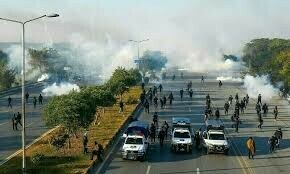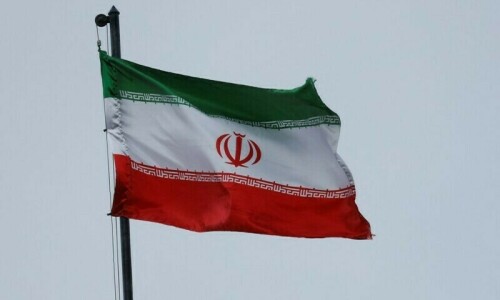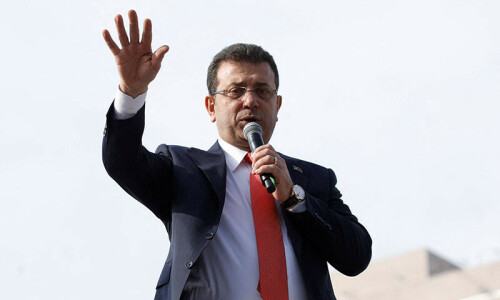PESHAWAR, Aug 13: The 11 Hospital Road, Peshawar, is perhaps the most enigmatic place in the city after centuries-old Balahisar Fort.
The enigma is, largely, owing to the overt and covert role they have had, impacting the history of Pakistan, Afghanistan, and Central Asia. They have shaped Peshawar to be what it is to foreigners today — a volatile and dangerous city. Balahisar is an old military bastion that has withstood and served invaders from Punjab and Afghanistan centuries ago. The Hospital Road bungalow, housing a US diplomatic outpost, has helped Washington won many a battle in this region. It has a fair share in the USA’s victory against USSR.
The two icons share similarities in today’s insecurity-riddled Peshawar.
In a lighter vein, both are out of bound for Peshawarites, who can’t even access their external security barriers. Their security cordons and boundary walls (as one could only see them) are the best lit in the city and their lights never go off throughout the whole night. They surely have got good generators to beat power outages.
On a serious note, they have elaborate security arrangements in and around their premises to keep the terrorists and common citizens at a bay.
Both have had their share in making life difficult for ordinary citizens as their security appear to be the foremost priority for the rulers than people’s right of mobility. Peshawarites have seen many roads barricaded and several closed to protect VIPs. So, if the Hospital Road has been closed down for over 12 years, it is no more a matter of public concern as people are, apparently, unwary of their rights.
However, those in love with Peshawar and wanting to show that part of the city to their young children, they can give them an aerial view of the Hospital Road and its adjacent alleys by using Google Earth, though the pictures would be a couple of years old.
Washington and Islamabad have had an uncomfortable working relationship. A reflection of their uneasy diplomatic ties reins high in and around the US Consulate. It does not boast only the security arrangements taken to protect it from the terrorists’ attack.
An air of suspicion surrounds it. Visitors, including those invited for official business, are treated with distrust, ensuring security of the premises.
Visit to the place, possible only if one is invited for some official business, leaves some with haunting impression that it is a place where West’s insecurities meet East’s vulnerabilities.
Multiple layers of security barriers -- in varying shapes, sizes and materials -- outside the consulate and modern screening machines that one has to pass through (no matter even if one is an invited guest) inside the premises make one believe that it is an impregnable little Western fortress in a chaotic Peshawar.
Agents of Pakistani spy agencies make their presence more than visible outside the consulate. They approach you as you walk by their place close to the walled premises. Introducing himself as inspector so and so of such-and-such intelligence agency, he would demand your ID card to verify your nationality, noting particular from it. You would be asked questions about your profession and purpose of your visit. On your return, the guy talks in a friendlier tone. He asks about names of those who spoke to you and the foreigners (if any) present on the occasion.
Obviously, you are expected to share details of the meeting. And if finds you evasive or avoiding sharing information, he tells you your boss’s name and reminds you the location of your office and how close his office is to your workplace.
Same goes for the security detail inside the consulate. After clearance from walkthrough gates and modern screening machines, your handbags and wallet would be subjected to hand checking.
Visitors’ cellular phones and other electronic gadgets are not allowed inside the main building. They are asked to leave their cigarette packs and lighters, if any, with the security guards at the bungalow’s main entrance.
The Pakistan-US relations are a paradox, hard to understand. The two countries are friends or foes, no one could tell with certainty. Though governments of the two countries claim to be friends, one can understand the necessities behind such claims.
Pakistan needs financial help from the US to keep its economy rolling and military satisfied. It is also important to fight out extremism.
The USA needs Pakistan military’s cooperation for an honourable, cost effective and safe exit from Afghanistan. It is simple in words, but difficult to materialise. Their diplomatic bickering is prolonging the war in Afghanistan and Pakistan’s tribal areas.
Tumultuous 33 years of war in Afghanistan have caused a lot of sufferings to people of Khyber Pakhtunkhwa. They have been brutalised by bomb blasts and militancy.
They have lost civil liberties to a clique of ruling elite that never lets such an opportunity goes wasted.
End of the armed conflict is in people’s interest because peace is better than war.















































